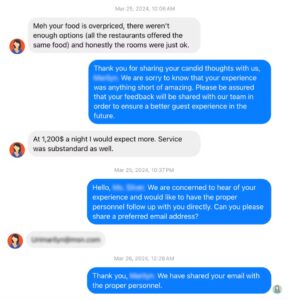In a dream world, we’d live in a hospitality realm where only appreciative guests exist. They’d only write glowing, five-star reviews, leave over-glorified comments on Instagram, and share incredible memories on Facebook for all their friends and family to see.
As passionate wanderers ourselves, we know firsthand that traveling isn’t all rainbows and butterflies. Guests have rainy travel days or less-than-sunny experiences, and when they take their frustrations to social media, our monitoring team shines.
Our monitors are a direct extension of your hospitality team. They navigate the virtual space where your guests are permanent residents. From comments to direct messages and beyond, our monitors interact with every alert, positive or negative.
Dealing with difficult guests is a daily occurrence for your team—and ours. We’ll walk through the best practices to navigate these unpleasant but typical situations on social.
The Sound of Sympathy
The best way to de-escalate a spiteful situation on social media? Listen. And listen wholeheartedly with the intent of understanding—not responding. To provide an adequate answer, support teams must first comprehend the scenario. If something is unclear, follow-up questions can be asked.
It’s imperative to maintain a positive tone when handling difficult interactions. We believe in reciprocity, but there is no need to match difficult guests’ energy. Using negative language will only add fuel to the flame, whereas sympathetic verbiage is an ingredient to help tame a heated situation.
Real-Time Responses
See how our monitoring team responded to an honest guest about their experience at The Ritz-Carlton Half Moon Bay.

Winning Over Relationships
According to Convince & Convert, addressing a social media complaint can boost customer advocacy by up to 25%. Responding thoughtfully and sincerely shifts the users’ association with your brand or hotel. At the end of the day, guests want to feel heard and know that their opinions matter.
Real-Time Responses
For example, a guest of Emmy Squared shared their frustrations about long wait lines and unsatisfactory service. Our team responded promptly and sincerely apologized for the uncharacteristic experience, which the guest appreciated. We then asked for the guest for their contact information so someone at the restaurant could further make amends with them. We contacted the restaurant team the next day to ensure they closed the loop with the disgruntled guest.
The guest was highly appreciative and satisfied with our team’s timely responses. This positive interaction changed the user’s perspective of Emmy Squared and led to a return visit.
Backing The Brand
There are times when users may target a brand as a whole as opposed to a singular hotel or restaurant. An incident could have happened thousands of miles away, but social media users have no problem airing their frustrations with any hotel associated with the brand that wronged them. While it’s not the fairest perspective, it happens, and we have some tips to help tackle these situations:
-
Respond promptly and professionally.
-
Address the situation.
-
Listen and monitor proactively.
-
Engage with positive comments and users.
-
Be transparent and authentic.
-
If the guest is a keyboard warrior, hide their comments.
Real-Time Responses
Giordano’s received hateful comments about not opening a new restaurant in Omaha. Users would comment on any post, new or old, complaining about it. With the number of negative comments increasing daily, we alerted the client and suggested to begin hiding comments. Alternatively, we sent the client verbiage to post in response to the spiteful messages. The client gave us the green light to hide disrespectful and targeted comments and respond with the approved language to the genuine ones.
Learning From Others
Sometimes the best teachers are competitors. Especially if they teach you what not to do. Every brand has its preferred method of handling difficult customers on social, however, we’ve compiled a list of common pitfalls we recommend avoiding:
-
Ignoring or deleting comments.
-
Writing generic responses.
-
Deleting posts.
-
Delaying responses.
-
Not following up promptly.
-
Lacking empathy and not apologizing when necessary.
-
Not having a customer-centric approach.
-
Failing to provide assurance.
-
Being repetitive in their conversation with the guest.
Real-Time Responses
While enhancing one of their historic buildings, the Hotel del Coronado received an influx of concerning comments. Guests spoke candidly on social media about how the renovation noise affected their stay. Our team responded to and tracked every negative comment that came through.
In hopes of limiting the number of hateful comments, we sent the client verbiage that transparently let guests know what to expect upon arrival. The property team approved our messaging and we started replying to users empathetically. The guests appreciated our new approach and some even advocated from our side on social.
Migrating Offline
Thinking ahead is the name of the game. It’s imperative to know when to move a public conversation into a private one. The best time to take an interaction offline is when the guest’s issue is complex and requires detailed information. Sharing confidential or sensitive information is not advisable on public forums. It’s best to share or seek such information over private messages.
Managing Morale
While your team is hard at work managing guest relations, it’s paramount to check in with those handling these difficult interactions. Dealing with negativity regularly can easily take a toll on one’s well-being. Ensure your team is set up for success and eliminate any emotional tolls with the following tips:
-
Build an expansive knowledge database.
-
Host efficient training about SOPs and KPIs.
-
Create a collaborative environment with peers.
-
Don’t take guest complaints personally.
-
Have weekly check-ins and allow time for feedback.
-
Shadow peers from time to time.
The Rise of AI
With artificial intelligence appearing on website chatboxes and social media search bars, it’s valuable to consider how this factors into social media customer service. While human interaction remains at the forefront of difficult situations, AI will help identify messages that need to be addressed promptly and move them to the front of the queue.
Closing The Loop
The golden rule of handling difficult situations on social? Closing the loop. It amplifies your hotel’s empathy and truly shows that your brand cares about the guest experience. Pair this with listening, understanding, positivity, transparency, and strategic thinking, and navigating difficult situations becomes easy.





